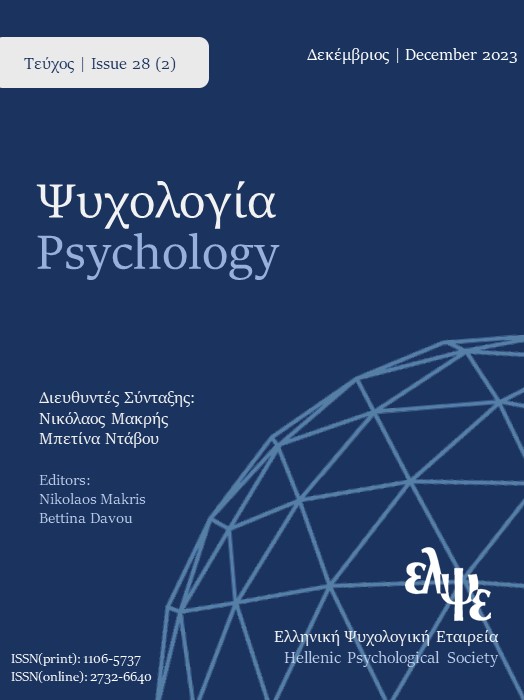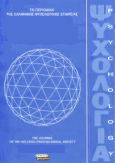Σύντομη εξέταση της νοητικής κατάστασης σε αναλφάβητα άτομα και σε άτομα με χαμηλό εκπαιδευτικό επίπεδο: Περιορισμοί και προτάσεις

Περίληψη
Η αύξηση του προσδόκιμου ζωής συσχετίζεται με αύξηση του αριθμού των ηλικιωμένων ατόμων τα οποία διαγιγνώσκονται με άνοια. Με βάση το γεγονός ότι τα άτομα με χαμηλό εκπαιδευτικό επίπεδο/χωρίς εκπαίδευση συχνά αποτελούν την πλειονότητα ερευνητικών δειγμάτων ηλικιωμένων, καθίσταται επιτακτική η ανάγκη να αναγνωριστούν -ή/και να δημιουργηθούν εκ νέου- κατάλληλες νευροψυχολογικές δοκιμασίες για την πρώιμη ανίχνευση και τη διάγνωση γνωστικής έκπτωσης στη συγκεκριμένη ομάδα. Δεδομένου ότι αρκετές νευροψυχολογικές δοκιμασίες υποεκτιμούν τις γνωστικές δεξιότητες των αναλφάβητων ατόμων και των ατόμων με χαμηλό εκπαιδευτικό επίπεδο, η χορήγησή τους σε αυτές τις ομάδες χρήζει επανεξέτασης ή απαιτείται αναθεώρηση της μορφής τους. Ένα ευρέως χρησιμοποιούμενο διεθνώς εργαλείο κατά την κλινική εκτίμηση είναι η Σύντομη Εξέταση της Νοητικής Κατάστασης. Η εκπαίδευση αποτελεί σημαντικό προβλεπτικό παράγοντα της επίδοσης σε αυτή τη δοκιμασία, ως εκ τούτου, παρατηρείται διαφωνία μεταξύ των ερευνητών σχετικά με τη χρήση της σε πληθυσμούς με χαμηλό εκπαιδευτικό επίπεδο/χωρίς εκπαίδευση. Προκειμένου να μειωθεί η επίδραση της εκπαίδευσης, καθώς και άλλων παραγόντων, στην επίδοση, είναι διαθέσιμο ένα ευρύ φάσμα ερευνητικών προτάσεων, ωστόσο, αρκετοί μεθοδολογικοί περιορισμοί παραμένουν και κάποιοι νέοι έχουν προκύψει αναφορικά με τη χορήγηση της δοκιμασίας σε αναλφάβητα άτομα ή σε άτομα με χαμηλό εκπαιδευτικό επίπεδο. Στην παρούσα μελέτη, παρουσιάζουμε μια επισκόπηση των δυσκολιών που προκύπτουν κατά τη χρήση και ερμηνεία της επίδοσης της Σύντομης Εξέτασης της Νοητικής Κατάστασης, τις προτάσεις χορήγησης και τους περιορισμούς που ανακύπτουν εξ αυτών, καθώς επίσης, υπογραμμίζονται οι βέλτιστες μέθοδοι χρήσης της κλίμακας για την κλινική εκτίμηση ατόμων με χαμηλό εκπαιδευτικό επίπεδο/χωρίς εκπαίδευση.
Λεπτομέρειες άρθρου
- Πώς να δημιουργήσετε Αναφορές
-
Μανδυλά Μ.-Α., & Κοσμίδου Μ. (2023). Σύντομη εξέταση της νοητικής κατάστασης σε αναλφάβητα άτομα και σε άτομα με χαμηλό εκπαιδευτικό επίπεδο: Περιορισμοί και προτάσεις. Ψυχολογία: το περιοδικό της Ελληνικής Ψυχολογικής Εταιρείας, 28(2), 141–157. https://doi.org/10.12681/psy_hps.31694
- Ενότητα
- ΑΝΑΣΚΟΠΗΣΕΙΣ

Αυτή η εργασία είναι αδειοδοτημένη υπό το Creative Commons Attribution-ShareAlike 4.0 International License.
Το περιοδικό ΨΥΧΟΛΟΓΙΑ έχει υιοθετήσει μία πολιτική Platinum open-access. Τα έξοδα υποβολής, επεξεργασίας ή δημοσίευσης των εργασιών καλύπτονται από την Ελληνική Ψυχολογική Εταιρεία. Τα πνευματικά δικαιώματα των δημοσιευμένων εργασιών προστατεύονται από την άδεια 'Creative Commons Attribution-ShareAlike 4.0 International'. Οι Συγγραφείς διατηρούν τα Πνευματικά Δικαιώματα και χορηγούν στο περιοδικό το δικαίωμα της πρώτης δημοσίευσης. Η άδεια αυτή επιτρέπει σε τρίτους, να χρησιμοποιούν την εργασία σε οποιαδήποτε μορφή, με την προϋπόθεση της διατήρησης των διατυπώσεων που προβλέπονται στην άδεια σχετικά με την αναφορά στον αρχικό δημιουργό και την αρχική δημοσίευση στο περιοδικό ΨΥΧΟΛΟΓΙΑ. Επιπλέον, κάθε διανομή της εργασίας οφείλει να γίνεται με τους ίδιους όρους διανομής, δηλαδή με την ίδια άδεια Creative Commons.



